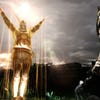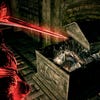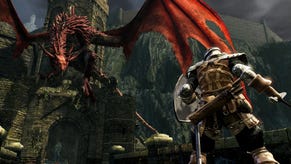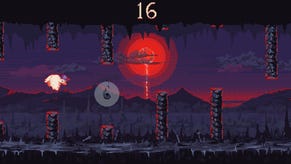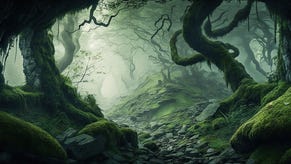Dark Souls
Into the heart of darkness.
Dark Souls is the work of a creator willing to press responsibility into the player's hands: someone who understands that with freedom comes agency, and that the very best video games are the ones that treat us as adults even as they allow us to believe in their worlds like children.
Even so, it's tough not to see Hidetaka Miyazaki as kind of a prick.
Predecessor Demon's Souls, 2009's sleeper hit, quickly garnered a reputation for being one of the very toughest video games. And with this pseudo-sequel, director-producer-game-designer-tea-boy Miyazaki has only stoked the fires of infamy, claiming with some braggadocio in interviews that he wants Dark Souls to be harder still.
The opening few hours of the game certainly deliver on this cruel promise. You awaken, a knight in rusty armour slumped in the belly of a long-forgotten dungeon, to the sound of a carcass being hurled through a square of light in the ceiling. Check the body and you find a key to your cell, allowing you to lumber free of its walls and take your first steps into a world of relentless hostility.
Its punishments for failure are swift and unflinching. You will pound your fist on the table in infuriation every time you allow yourself to be overrun by a group of skeletons by rushing into a graveyard too quickly, or when you fail to roll out of the way of a giant cave troll's club. Death comes easily no matter which of the 10 character classes you choose to play as - although pick 'Deprived', a character armed only with a fur thong, a club and an old panel shield (included, presumably, to allow masters to show off their mastery) and the mountain of failure will pile highest.
Your health bar isn't chipped away so much as swallowed whole by the parade of enemies that come your way, while its offensive counterpart, the green stamina bar, empties after just two swings of a weapon, forcing you to defend while regaining strength for the next swipe. Every step must be considered - put a foot wrong and the game will make a mockery of your shortcomings.
But the truth is that Dark Souls is indifferent to your imperfections. It merely reflects them back at you with more clarity than almost any other game. That is what makes it so difficult to play. But more importantly, it is what makes it so hard to walk away from. It's a game that offers you the chance to improve yourself.
It is, in many ways, also a game with the training wheels removed. The changes are as difficult to perceive as the emaciated heroin-chic monsters that lurk in the gloom of its first dungeon but - in the context of contemporary video games, where responsibility and freedom have been exchanged for handholding and free candy - they are profound.
For example, there is no pause button to offer a moment's respite. Video games offer portals to new worlds but, outside of the arcade and online games, their makers have always given us the means to freeze them indefinitely, to take a breather in the safety of stasis. No more. If you need a toilet break while playing Dark Souls then you'd better find shelter behind a damp rock or under a shadowy bridge. Check the corners for bloodsuckers and phantoms and leave your avatar shivering wet while you sprint upstairs and back again as fast as possible, hygiene be damned.
Then there are the bonfires, those primordial gathering spots, used since time immemorial to ward off danger while giving out heat and comfort. So too, in Dark Souls, these glowing focal points recharge your energy and replenish your health. But they also reset all of the enemies in the immediate vicinity, ensuring that once you step from the fire's glow, risk will follow reward.


